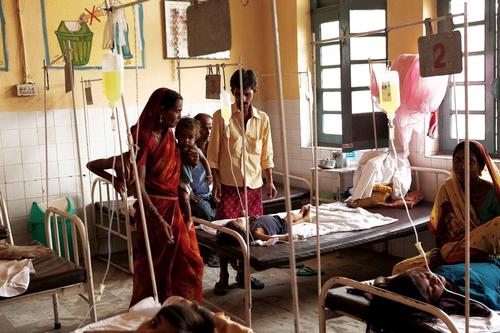For a long time now, Médecins Sans Frontières (MSF) has been working towards improving diagnosis and treatment for kala azar (visceral leishmaniasis) all over the world. Bihar state, where MSF runs a kala azar project, is one of the most endemic areas in India, with more than 10,000 cases annually. Together with the state government of Bihar, MSF has been working towards providing kala azar treatment in primary health centres (PHCs), which are part of the public health system. This approach ensures that the poorest, most vulnerable communities who make up the majority of people infected by the disease can access treatment.
Public health challenges
Since 2007, MSF has been running a kala azar project in Bihar to bring attention to this public health challenge, and currently the state is showing a positive trend with a reduction in the number of cases due to increased awareness and scaling up of kala azar treatment in the public health system. “Most patients come to our facilities when the disease is already at an advanced stage because people are still not familiar with the signs and symptoms or do not know where they can find adequate diagnosis and medication,” says Dr Prince Mathew, MSF’s deputy medical coordinator in India. “Many communities with high prevalence lack access to diagnostics, and treatment in the private sector is not only expensive but also takes too long, which in turn poses serious risks of increasing drug resistance,” he adds.
Raising awareness
MSF has been raising awareness about the symptoms of kala azar; encouraging patients who have symptoms like prolonged fever, weakness, loss of appetite or a swollen abdomen to seek free treatment at the nearest PHC, as well as advocating for correct diagnosis and treatment in PHCs, which are easily accessible for patients. “It is critical to increase treatment literacy and awareness in the community so that patients avoid charlatans and seek effective treatment at the nearest PHC,” says Dr Ramashis Kumar, civil surgeon at Vaishali district hospital.
Partnering for success
By partnering with the National Vector-Borne Disease Control Programme (NVBDCP), the Bihar State Health Society and other partners including the Drugs for Neglected Diseases Initiative (DNDi) and Rajendra Memorial Research Institute (RMRI), MSF will be able to increase access to newer treatment modalities using the vast government public health infrastructure, bringing free treatment closer to patients’ homes and ensuring less disruptions to their lives.
Since July 2007, MSF has treated over 12,000 kala azar patients in Bihar. Currently, MSF supports a kala azar ward inside the Sadar district hospital in Hajipur, Bihar, and five PHCs in Goraul, Vaishali, Mahua, Mahnar and Raghapour in neighbouring blocks.



